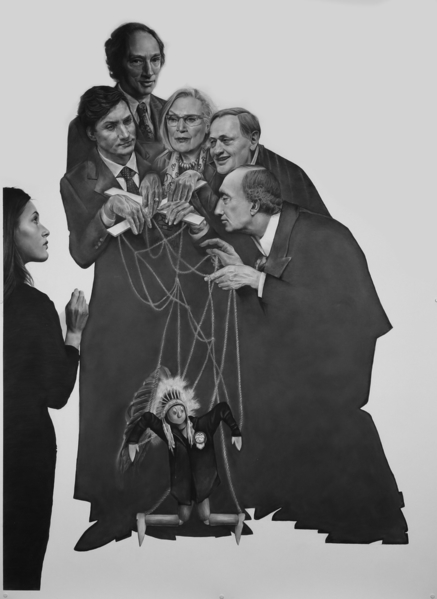Over recent years in the context of reconciliation with Indigenous Peoples be it indicated by acknowledgements at the get go of meetings or announcements of policy’s and initiatives, there has remained a sense for me we are not going about reform and change very well. Mary McPherson’s drawing “Reconcile What?” helped to wake me up.
(Mary McPherson drawing from https://www.behance.net/marymcpherson ![]()
How do we bridge: understanding with action that advances Indigenous Peoples in our society? Where have I got it wrong and right on the steps, – because I have it both ways.
Here are some approaches that I use to engage and learn from:
Reconciliation: The False Promise of Trudeau’s Sunny Ways: Under the Liberals, statements of moral feeling have been elevated to a governing strategy
…What appeared to be a sweeping transformation was, in fact, a skilful technique for managing the status quo: everything would appear to change in order for things to remain the same. It was the changeless change that the Liberals so excelled in. The outcome would be stamped as reconciliation but would, in fact, be what Indigenous peoples had been fighting in each generation: being consigned to small land bases, shorn of any say over developments in their traditional territories, with the right to administer their own poverty. This relationship wouldn’t be nation-to-nation. It would be nation-to-municipalization. Nation-to-glorified-reservation. Nation-to-dressed-up-subjugation. …
https://thewalrus.ca/the-false...9o0usz8fPkDw6TuWFmpc
Yellowhead Institute
…For too long, the relationship between First Nation peoples and Canadians has been characterized by inertia: the same old, paternalistic and racist policies and the corresponding apathy and neglect. Yet, the resistance of Indigenous peoples continues to grow and today, there is an acceptance on behalf of governments and Canadians that change is required. This is a tremendous opportunity. The challenge is ensuring the direction of change is towards the transformational. Yellowhead Institute can play an important role here, scrutinizing government policy, advocating for the rights of First Nation peoples, and models of change that support First Nation jurisdiction. …
Russell Diabo
…Since the federal election of 2015, the Trudeau government has embarked on a top-down, nontransparent approach to federal Indigenous policy. There are reportedly 40 to 50 “exploratory tables” with Indigenous groups. We don’t know the topics or with whom the federal government is holding discussions, but these discussions are supposed to feed into an equally opaque Working Group of Ministers on the Review of Laws and Policies Related to Indigenous Peoples.
The discussion results are to be presented to a “bilateral mechanism” — federal cabinet committees based on political agreements with three national Indigenous organizations representing the Inuit, Métis and the Assembly of First Nations, a Chiefs’ organization. This stealth approach to change policy and law bypasses the legitimate rights holders: the Indigenous peoples. They are the ones who have a right to self-determination, not the national Indigenous leadership groups. …https://policyoptions.irpp.org...ans-something-worse/
Whose Land Is It Anyway? A Manual for Decolonization
…Now that we have proven that we will not accept annihilation, we find ourselves in an era of reconciliation. Reconciliation? Like many of my sisters and brothers, I have trouble understanding what it is that we are trying to reconcile. Is the time for fighting over? Have we come through to the other side of the nightmare that is history? Have we decolonized this country? Reconciliation: the invitation from Canada to share in the spoils of our nations’ subjugation and dispossession. What a tainted gift, and such a false promise. Reconciling with colonialism cannot heal the wounds the colonizers have wrought on our collective existence. The essential harm of colonization is that the living relationship between our people and our land has been severed. By fraud, abuse, violence and sheer force of numbers, white society has forced us into the situation of being refugees and trespassers in our own homelands and we are prevented from maintaining the physical, spiritual and cultural relationships necessary for our continuation as nations. …
https://fpse.ca/decolonization...se_land_is_it_anyway
Dennis McPherson
Indian on the Lawn: How are Research Partnerships with Aboriginal Peoples Possible?
… The culture is then, in a sense, transforming itself in a normal and healthy way. In my own research I have found that underlying the diversity of Native American cultures is a pattern of Indigenous thought that is itself a form of transformative philosophy. (19) When Native researchers write about their own cultures they are not only transforming those cultures, they are also transforming themselves, for they are given the opportunity to discover and transform their own prejudgments. As Crusius notes, “we cannot even know our own history, the complex conventions we have internalized; for the most part we can only live it/them, for we are it/them.” (20) Native researchers in learning more about themselves by writing about their own culture are keeping that culture alive by actually making the culture conscious of itself. …
More suggestions? Please add to comments section, thanks.


